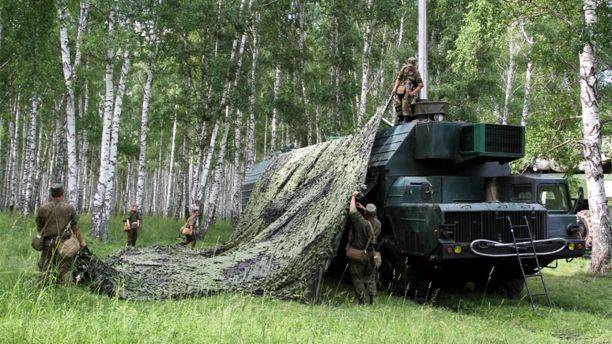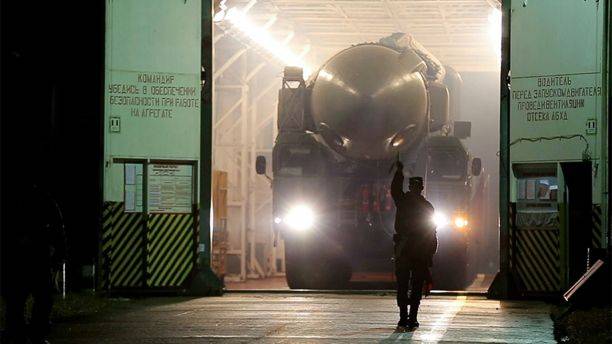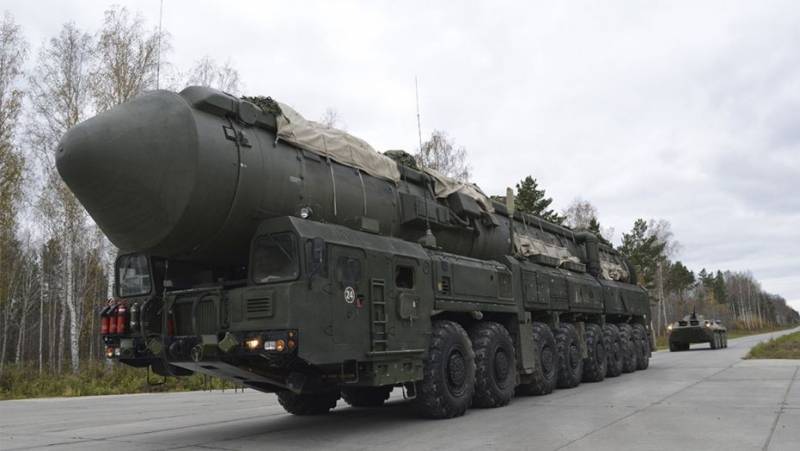Russian nuclear arsenal. Barking, but not biting?
An article with the provocative title “Russia's nuclear arsenal: All bark and no bite?” Was prepared by Perry Chiaramonti, the head of the Fox News investigation department and his colleague Alex Diaz. In their material they tried to answer the question in the heading.
At the beginning of the article, a curious feature of the current situation is noted, namely the general atmosphere and expert assessments. Now there is a certain increase in fears associated with a possible nuclear war, as it was during the Cold War. At the same time, some experts in the field of security note the low probability of a successful nuclear attack from Russia. However, there are other reasons for concern. First of all, these are local conflicts that attract the attention of powerful powers.
The authors write that against the background of general concerns about the possible start of a new Cold War, research from Fox News shows the absence of real risks associated with a hypothetical attack from Russia. Unnamed nuclear weapons experts believe that the Russian nuclear arsenal is defensive in nature. Moscow has the ability to deliver a first strike, but it is unlikely to use it. Experts believe that the first strike potential of Russia is unlikely to be effective.
The situation was commented by a senior military expert at Stratfor analytical organization Omar Lamrani. According to him, as part of its nuclear triad, the United States pays more attention to the maritime component, while Russia relies on land systems. O. Lamrani also believes that the developed maritime component of the US nuclear forces makes it possible to gain a certain advantage over Russia. He sees the reasons for this in the relative weakness of the Russian armed forces.
The expert points out: since the Russian navy is weaker than the US, it has to use a defense-oriented strategy. At the same time, this approach allows Moscow to reduce the negative impact of problems associated with less military might.
P. Chiaramonti and A. Dias, comparing the capabilities of Russia and the United States, touch upon the issue of military budgets. Russian defense spending is 69,2 billion dollars - several times less than the United States with its 554,2 billion. They also compare the number of armies. Thus, the Russian ground forces are much larger than the American ones. At the same time, Russia is noticeably lagging behind quantitatively in the areas of naval and air forces. Based on this, Fox News authors conclude that American forces are superior to Russian ones.
O. Lamrani commented on relevant international agreements in the field of strategic weapons, namely, the START treaty currently being implemented. He assumes that Russia wants to keep this treaty or sign a new agreement of this kind. With the help of such a treaty, Moscow can maintain an advantageous position in the international arena and have parity with Washington. The current START treaty, ratified in 2010, is the third such agreement between the United States and Russia.
The current START III agreement provides for a two-fold reduction in deployed carriers of nuclear weapons. The maximum number of warheads on duty at the same time is limited to 1500 units.
According to O. Lamrani, the cancellation of the START III treaty or the termination of its validity could have unpleasant consequences for Russia. With such a development of events, its strategic nuclear forces will not be able to quickly increase their arsenals, and this will put them at a disadvantage. The representative of Stratfor believes that the absence of restrictions on nuclear weapons will not allow Russia to compete in this area with the United States. The existing agreement, in turn, gives Moscow a certain potential for negotiation.
Another specialist interviewed by Fox News staff has a different opinion. He believes that the situation is much more complicated, and the escalation of tension between the United States and Russia of the way to lead to the most severe consequences.
Hans Christensen, head of the Nuclear Weapons Information Project of the Federation of American Scientists, recalls that there will be no winners in a nuclear war, and this is a generally accepted conclusion. If the relations of the countries finally deteriorate, and the conflict begins to escalate, which is capable of getting out of control, then an exchange of nuclear missiles can quickly follow. We are talking about many hundreds of warheads launched by targets in two countries.

H. Christensen resorts to grim irony. He says that you can put a cross on the map and just watch how quickly this place will be colossal destruction and a concomitant radioactive contamination will appear.
Also, a FAS representative points to the presence of an incorrect methodology for evaluating nuclear arsenals. There is a practice of comparing the current state of the strategic nuclear forces of countries with the state of the Cold War times. H. Christensen believes that such a comparison is not correct and correct. Thus, with such a comparison, representatives of the Pentagon can declare that at present the United States has less than 4 thousand nuclear charges - so few of them were only during the time of President Dwight Eisenhower.
Indeed, the absolute numbers of nuclear warheads have declined in recent years. However, as rightly noted by H. Christensen, it should be borne in mind that the current weapons are much more efficient than those that were under Eisenhower. Thus, much more can be done with the current arsenals than with the nuclear forces of the past. As a result, direct comparison in quantity does not make sense.
Also, the scientist draws attention to the situation with the "nuclear club". In the second half of the 20th century, half a dozen countries concentrated all their efforts and created their own nuclear weapons. France, China, Britain, Israel, Pakistan and India acquired nuclear weapons, and the total number of such weapons in the world has increased markedly. The nuclear powers, which created their strategic forces during the Cold War, gradually reduced their arsenals. At the same time, other countries, such as North Korea, are gradually increasing them.
H. Christensen believes that at present there is a real risk of armed conflict with the use of nuclear weapons. However, in his opinion, this is a regional scale collision. Similar events can occur on the border of India and Pakistan or on the Korean Peninsula. It is not excluded that a local conflict with the use of nuclear weapons will attract the attention of larger nuclear powers.
The specialist proposes to present a scenario in which the United States will not independently participate in a war with the use of nuclear weapons. At the same time, they can assist their ally, who has this kind of own weapon. If Washington decides to help an ally, then we should expect that Moscow or Beijing will defend the other side of the conflict.
The current Offensive Arms Reduction Treaty is valid until 2021. According to H. Christensen, the main issue in the context of this agreement is its new extension for five years. If the treaty is not renewed, the usual international negotiations can escalate into a global dispute.
If the START-III treaty is not renewed or a new agreement is not replaced, the events will follow a specific scenario. Hans Christensen recalls: in this case, it turns out that for the first time since the seventies, the United States and Russia will not be bound by any restrictions in the field of strategic nuclear forces. Both countries already have a very serious nuclear potential, and may threaten each other. All this the scientist considers a big problem.
The Fox News material ends with H. Christensen's fabrications about the treaty on the elimination of medium and short-range missiles. The representative of the Federation of American Scientists believes that the refusal of such an agreement does not represent a direct danger to Russia and the United States. The reason for this is the insufficient range of the missiles that fall under its action. At the same time, short-range and medium-range missiles can pose a regional threat and pose risks for the allies of Moscow and Washington.
***
It is easy to see that the authors of the publication in Fox News did not give a direct answer to the question in its heading. In addition, they did not even hint at a possible answer, giving readers the opportunity to search for it themselves. At the same time, they brought curious statements by two specialists from well-known organizations. The opinions of these specialists differ significantly from each other, which may resemble an attempt to objectively consider the problem.

It is necessary to note the urgency of the problem raised in the article “Russia's nuclear bass and no bite?” Indeed, amid the deteriorating international situation, predictions about the start of the second Cold War, as well as more rigorous assessments that the global armed conflict. In this context, it would not hurt to assess the military potential of large countries in general, as well as their strategic nuclear forces in particular.
The authors of Fox News, reviewing the issue of the state and potential of Russian nuclear arsenals, received a comment from two experts in the field of weapons. Interestingly, their opinions on the topical issue differ markedly. One of them is prone to a low assessment of Russian nuclear forces, while the other sees them as a potential threat. Their opinion on the future of strategic weapons in the light of current treaties and their possible absence is also different.
Omar Lamrani, representing the analytic organization Stratfor, pays special attention to the relative weakness of the Russian armed forces, including their nuclear potential. In addition, he believes that nuclear missiles of various bases are perhaps the only factor that allows Moscow to remain an active player in the international arena. Also, O. Lamrani points out the importance of the START III treaty for Russia, since after its termination, he believes, the United States will receive serious advantages.
Hans Christensen of the Federation of American Scientists expressed a different opinion. He pointed to obvious considerations about the likely outcome of a full-scale nuclear war, and also actually urged not to underestimate the Russian potential. In addition, he stated that the method of comparing arsenals according to their simple number was incorrect, without taking into account all other important factors. Finally, he touched on the theme of the strategic situation in the world and the influence on its armaments of both the leading powers and the relatively new members of the “nuclear club”. H. Christensen believes that in some situations, events can develop in negative scenarios with all serious consequences.
In the title of their article, P. Chiaramonti and A. Dias ironically ask about the real possibilities of Russian strategic nuclear forces. However, further direct response should not be. However, with well-known information, you can try to give your answer. Indeed, the Russian arsenal is capable of “barking”, but so far no one “bites”. And the reasons for this lie far from weakness or technical problems.
It is well known that the Russian nuclear triad, like its competitor from the United States, regularly conducts tests of various systems and weapons, as well as arranges missile training launches on training targets. Such events, using the terminology of Fox News, can be called “barking”. The “bite” is probably proposed to refer to the actual use of nuclear weapons and their results.
Obviously, Russia's nuclear forces are fully capable of delivering a full-scale missile attack on a host of enemy targets and to ensure maximum damage. However, this does not happen. The international situation at the moment makes it possible to get by with other instruments for advancing one’s interests and not resorting to the most serious means. However, in understandable circumstances, Russia will be forced to use strategic nuclear forces, and the result can hardly be perceived with irony.
The article "Russia's nuclear arsenal: All bark and no bite?":
http://foxnews.com/world/2018/08/08/russias-nuclear-arsenal-all-bark-and-no-bite.html

Information